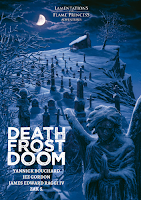* This post was written a year ago. I've fallen off the blog, but here I am getting back up again.
This will be a bit of a rant. Since coming back to
role-playing I’ve largely played with modern, new-school players – people who
began playing with 3e or later. Although there have been a handful of playstyle
discrepancies I’ve had to work around, the one that drives me nuts more than
any other is what I refer to as knowledge-check cheat codes.
The best I can articulate this phenomenon is when a
player asks for a chance for their character to know something that they as a
player don’t know, and that their character doesn’t have an in-game reason for
possibly knowing. This isn’t, “Can my dwarven fighter, who grew up in the
mines, tell us the value of these gems?” or “Is there any way being an
assistant pig-keeper before I became an adventurer help me identify these
tracks?” These are reasonable, in-game justifications which I as a referee can
deem acceptable on their face or call for a roll.
The type of play that I object to is when a player
requests to roll for things like: “I want to roll to see if my high
Intelligence would let me figure out this riddle,” or “Can I roll to tell if
the NPC is lying?” or “I want to make a check to figure out this monster’s vulnerability.”
Leaving aside the big no-no of players requesting to make a roll rather than
waiting for me to call for one, my issue with this type of play is that it’s
intended as a shortcut around the obstacle of the mysteries in the game. Rather
than role-play, use player skill, or hire specialist NPCs, the player would
rather trust to a high stat and dumb luck than to interact with the adventure.
I realize this style of play has probably always existed
to some degree, but since returning to gaming, I’ve noticed it more. Modern
systems, like 5e, have these kinds of mechanics built-in with player-side
checks for Insight, Investigation, Arcana, and History. These innate powers
give characters an objective, true answer to any question they have like a kind
of divination spell on the order of Know Alignment or Locate Object. It seems
to not just support, but encourage this kind of play.
I realize as a referee this is all under my control, but
I get tired of constantly fighting it. The other night, one of my players (a
good friend) was getting frustrated by the taunting interrogation the undead
antagonist was using against him during the fight. He wanted to know if his
character could determine an underlying pattern to what she was saying to him.
Playing Basic Fantasy, I told him to make an Ability Roll using BF’s optional
rule. He rolled a 20. I told him, “You put it together that her taunts are
focused around something you are physically carrying on your person which is
hampering your combat ability.”
He didn’t feel this answer was adequate considering he
rolled a 20. What I didn’t tell him was that the reason his attacks weren’t
effective was because his paladin was carrying a cursed dagger and necklace he
stole off an altar of a death cult four rooms ago. That’s the information that
he thought he deserved. One of the other players figured it out for him. He was
still griping about it at work today, commenting, “I guess it’s just different
DM-ing styles,” which felt like he was inferring I was being unfair.
He explained that the fun part of the game to him was
rolling crits and feeling like it was possible to win, not necessarily through
player skill, but through lucky dice. When he can't figure something out, he
wants the option to enter cheat codes. It’s an approach that is fundamentally
different than mine, one I’m not sure is reconcilable. My favorite part of the
game is in the mystery of the unknown and the risk involved in the discovery of
those secrets through interaction and role-play. My friend’s preference is to
circumvent all of that with powerful characters and lucky dice. This style of
play shortcuts what I feel is the central part of role-playing, the
back-and-forth dialogue between a referee and the players.
I’m trying to objectively assess my own bias about modern
play styles and wondering if I should just loosen up a bit. I’m not one of
those simulationist wargamer grognards who expects players to have a working
knowledge of battle tactics and combat formations. I think one can find a
middle ground, and I hope I can find mine while still finding people I can play
with.




I think what's important is to adress the expectatives of the roll (before the roll) Like "OK you can make an INT check but just to get some clues about whats going on".
ReplyDelete